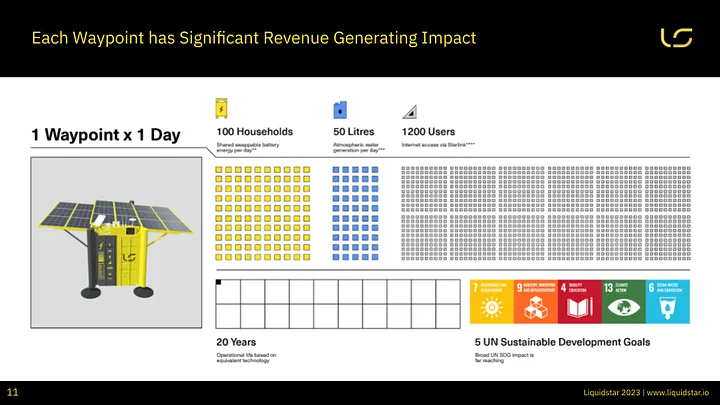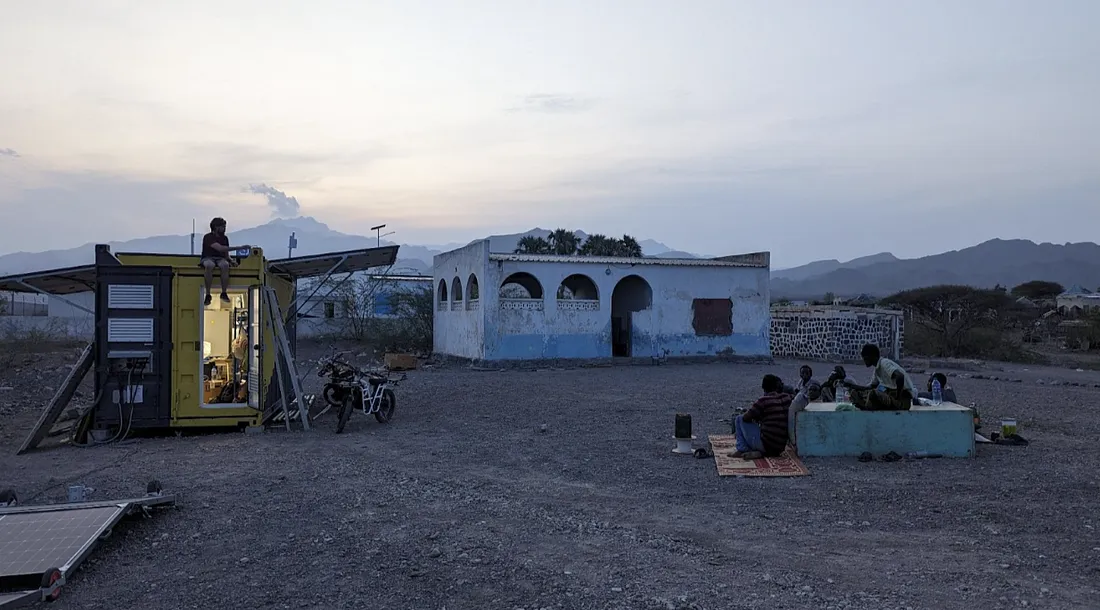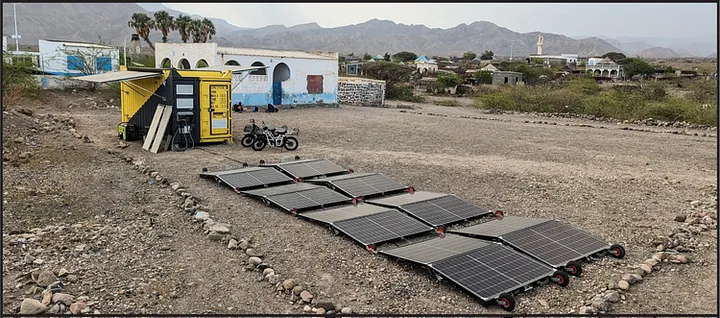Pilot Launch | Liquidstar: Bringing electricity, water, internet, and income to rural communities in Djibouti and Jamaica
Image courtesy of Liquidstar
In brief:
Globally, billions of people lack access to critical resources like electricity (700 million people), clean water (2 billion), and the internet (3 billion have never been online)
Waypoints represent a new approach to tackle these systemic challenges, launching micro data centers powered by renewable energy which offer services to local communities such as electricity (through solar-charged batteries) and internet (through a Starlink connection)
When appropriate, part of the solar energy is used for Bitcoin mining, contributing an additional revenue stream towards the sustainability of the Waypoints
This pilot seeks to measure the societal outcomes, commercial viability, and climate resilience generated by deploying innovative tech in rural areas
In the arid, drought-prone villages of Djibouti, the Mahamoud family gathers around a rented battery lamp after sunset. This light not only illuminates their home but also enables the children to complete their schoolwork after dark, offering a glimmer of hope in a community previously left in darkness. A short distance away, a Waypoint — a solar-powered micro data center — hums quietly, transforming lives by providing access to electricity, clean water, internet, and educational resources.
This isn’t just another piece of technology. It’s a lifeline for families like the Mahamouds and rural communities in Djibouti and Jamaica’s hurricane-impacted St. Elizabeth parish. Munro College, a historic school with over 1,000 students, suffered significant damage during Hurricane Grace in August 2021 , disrupting education and highlighting the need for resiliency in essential infrastructure. With Liquidstar’s innovative Waypoints, underserved regions now have access to the tools they need to recover and thrive, ensuring communities and institutions like Munro College can withstand future challenges while empowering their residents and students to achieve more.
Image courtesy of Liquidstar
The Challenge
Across emerging markets, the absence of reliable infrastructure for electricity, water, and internet creates barriers to growth and resilience. Globally, 700 million people live without electricity, 2 billion lack clean water, and nearly 3 billion have never been online. Traditional off-grid energy projects often struggle to remain financially viable due to limited local budgets and high operational costs. Moreover, the underbanked populations in these areas face expensive and slow fund disbursements, making it challenging to recover from climate shocks like hurricanes or droughts.
The Solution: Waypoints
Samantha Power, USAID Administrator:
“Liquidstar is using solar power to convert humidity — water in the air — into drinking water while using that same solar energy to power a school, a health clinic, and 80 rural households.”
Image courtesy of Liquidstar
Liquidstar has developed a breakthrough solution: Waypoints. These all-in-one micro data centers use renewable energy to power essential services and create self-sustaining ecosystems for rural communities. Here’s how they’re transforming lives:
Energy Access: Affordable battery rentals allow off-grid homes and businesses to access electricity, providing lighting and power for evening activities for families like the Mahamouds.
Water Access: Waypoints generate potable water as a byproduct, addressing a critical need at affordable rates.
Internet Access: Equipped with Starlink, Waypoints bring reliable internet connectivity, digitally linking these remote communities to the world.
Education Access: Locally-hosted AI-powered tools and resources, such as Kolibri, help students and teachers access high-quality educational materials and improve learning outcomes.
Learn-to-Earn Program: Students who complete educational courses or achieve high quiz scores earn rewards funded by Waypoint Bitcoin mining operations. These funds are distributed using Stellar’s blockchain platform, with students cashing out through local MoneyGram agents.
Digital Infrastructure: Waypoints bridge the digital infrastructure gap with their data center services. They enable communities to run AI inference, perform small-scale fine-tuning, host files, websites, and emails, generating revenue akin to a mini Amazon Web Services. This reduces currency risks and increases financial sustainability, and there are future plans to collaborate with decentralized computing companies like Akash.
How It Works
Image courtesy of Liquidstar
The Waypoints integrate cutting-edge technology and blockchain innovation to deliver comprehensive solutions for rural communities:
Renewable Energy Generation: Solar energy powers the micro data centers.
Bitcoin Mining: Excess energy is used to mine Bitcoin, ensuring a guaranteed revenue stream to sustain operations.
Service Delivery: Revenue from Bitcoin mining, water sales, battery rentals, and internet services covers operational costs while providing affordable access to essential services.
Fund Disbursement Rails: Blockchain technology enables rapid and secure distribution of rewards and financial aid to participants.
Educational Enablement: Locally-hosted AI tools and platforms provide access to educational materials, helping students and teachers achieve better outcomes.
Image courtesy of Liquidstar
Pilot Details
From December 2024 to June 2025, Liquidstar will pilot test Waypoints in Jamaica and Djibouti. With up to 100 participants, the pilot will measure the societal and commercial impacts of Waypoints, focusing on:
Educational Outcomes: Enhancing learning through AI-hosted tools.
Energy and Water Access: Providing sustainable, affordable utilities.
Financial Inclusion: Enabling blockchain-based financial services for underbanked populations.
Image courtesy of Liquidstar
Hypotheses and Learning Agenda
This pilot seeks to test the following key hypotheses about the societal, environmental, and commercial impacts of Waypoints:
Improved Societal Outcomes: Waypoints will increase access to electricity, water, internet, and education, thereby improving community well-being.
KPIs: Net Promoter Score (NPS), percentage of Bitcoin mining revenue distributed, number of educational courses completed.
2. Commercial Viability: Waypoints will demonstrate financial sustainability through diversified revenue streams.
KPIs: Revenue breakdown by source (Bitcoin, water, internet, battery rentals).
3. Climate Resilience: Waypoints will boost the climate resilience of nearby communities, enabling them to better prepare for, adapt to, and recover from climate-related risks and shocks.
KPIs: Number of water and battery rental customers, percentage of residents reporting increased climate resilience.
4. Blockchain Integration: Blockchain rails will enable cost-effective, time-efficient fund disbursements to underbanked populations.
KPIs: Amount distributed via Stellar platform, number of transactions processed.
Image courtesy of Liquidstar
A Vision for a Sustainable Future
Liquidstar Co-founder and CEO R. Scott Salandy-Defour shares his optimism:
“Waypoints are more than technology — they are gateways to opportunity. By harnessing the power of renewable energy and blockchain, we’re creating resilient, self-sufficient communities that can withstand climate shocks and thrive in the face of adversity.”
Image courtesy of Liquidstar
Stay Tuned
Liquidstar’s Waypoints represent a bold vision for addressing infrastructure gaps in rural communities. By combining renewable energy, blockchain technology, and AI-driven education, the solution holds potential for inclusive, sustainable growth in some of the world’s most underserved regions. Follow our journey as we document the impacts of Waypoints on rural communities in Jamaica and Djibouti.








